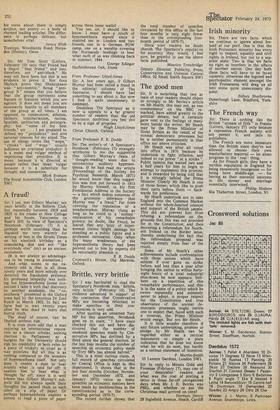A fraud?
Sir: I too, met Gilbert Murray, not once briefly in the Reform Club, but repeatedly between 1919 and 1925 in his rooms at New College and his house, Yatscombe on Boar's Hill. In view of Spectator's Notebook (February 17) it is perhaps worth recording than he thanked me very warmly for writing of him in the Straits Times on his ninetieth birthday as a stimulating don and not "like everybody else" (sic) as an ancient monument.
(It is not always so advantageous to be young in journalism.) And what seems to me extremely odd is that in all those ninety years and more nobody ever detected the fraudulent pretence: his professed telepathy was nothing but hyperaesthesia (some connection I take it with that discovery by another academic, the " coaesthesia " presented in the Oxford town hall by the notorious Dr Emil Busch in March 1922. In fact we have had to wait twenty years after he was dead to learn that horrid truth.
The dead of course, can be libelled without risk.
It is even more odd that a man enjoying an international reputation as a classic scholar, seeking election to Parliament as a burgess for the University should risk his credibility in both roles by a piece of trickery as cruel as it was pointless. But all this is as nothing compared to the wonders of hyperaesthesia itself. Not only does it enable a man to hear acutely what is said far off; it enables him to hear what is thought far off; since it is well known that Gilbert Murray's subjects did not always speak their thoughts but passed them to each other on a slip of paper. Or perhaps hyperaesthesia enables a person to read a piece of paper
You see, sir, I should like to know. I must have a touch of hyperaesthesia myself since it enabled me in London and two friends, one in a German POW camp, one on a warship covering the Normandy landings to hear what each of us was thinking back in summer, 1944.
George Edinger Hatfieldbroad Oak, Essex


































 Previous page
Previous page